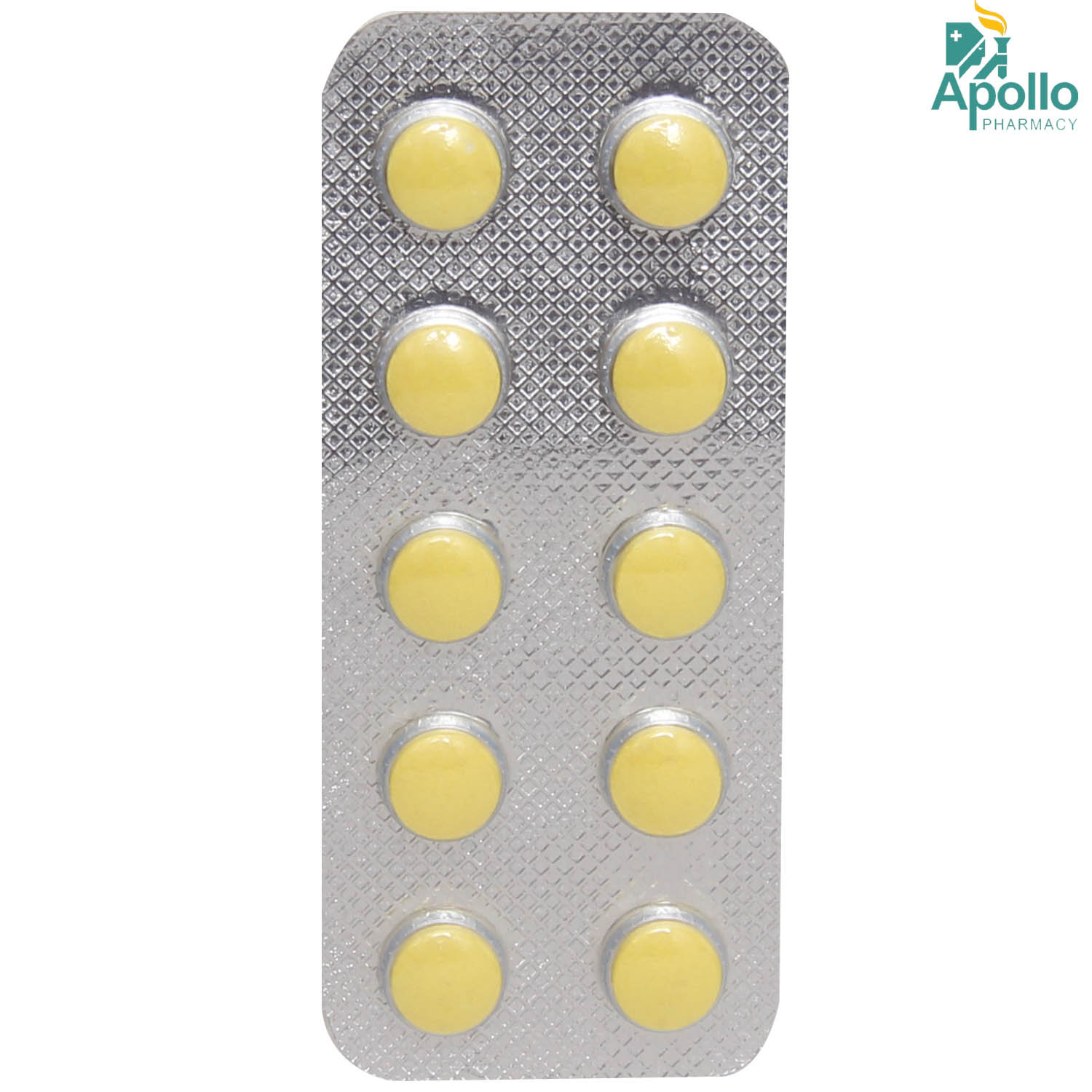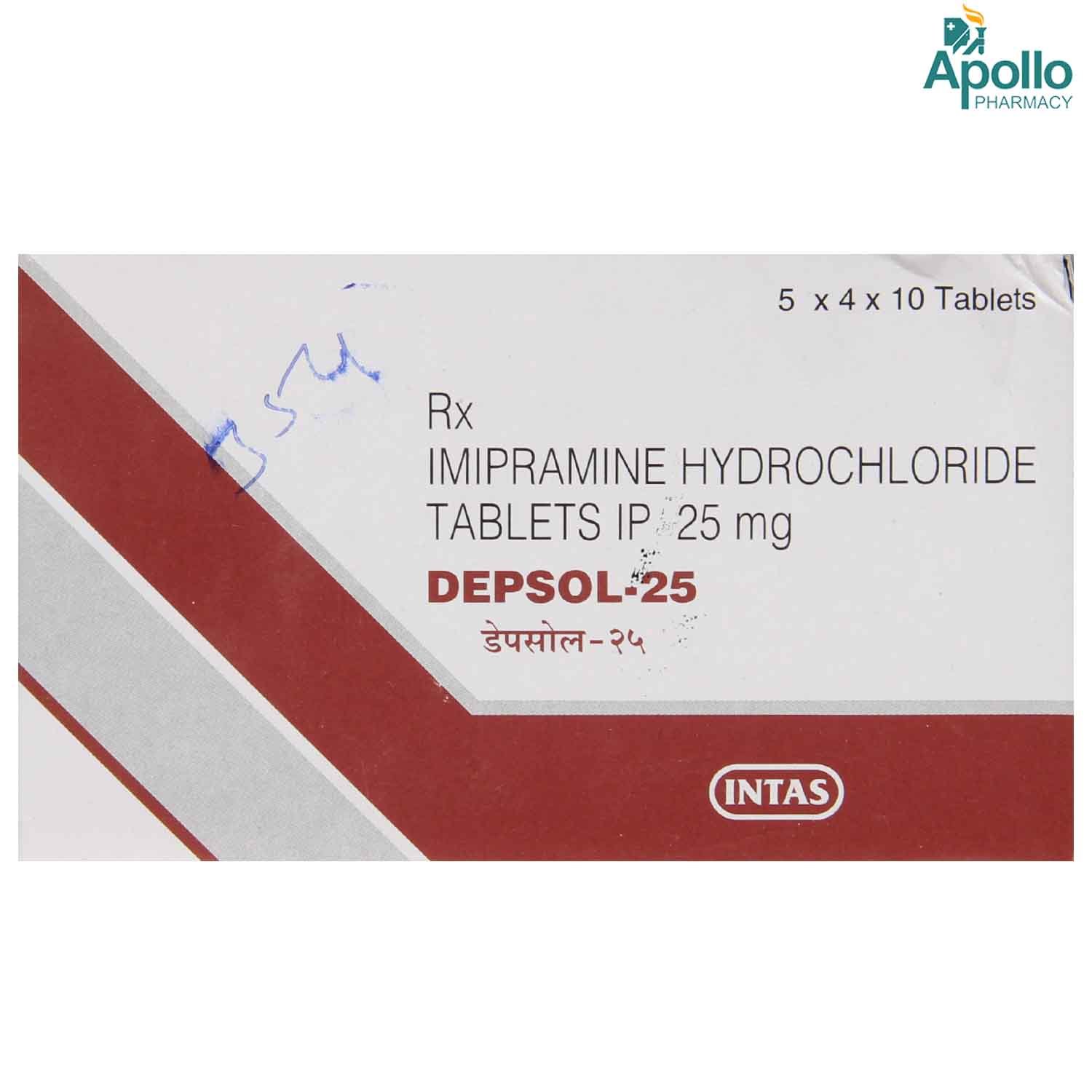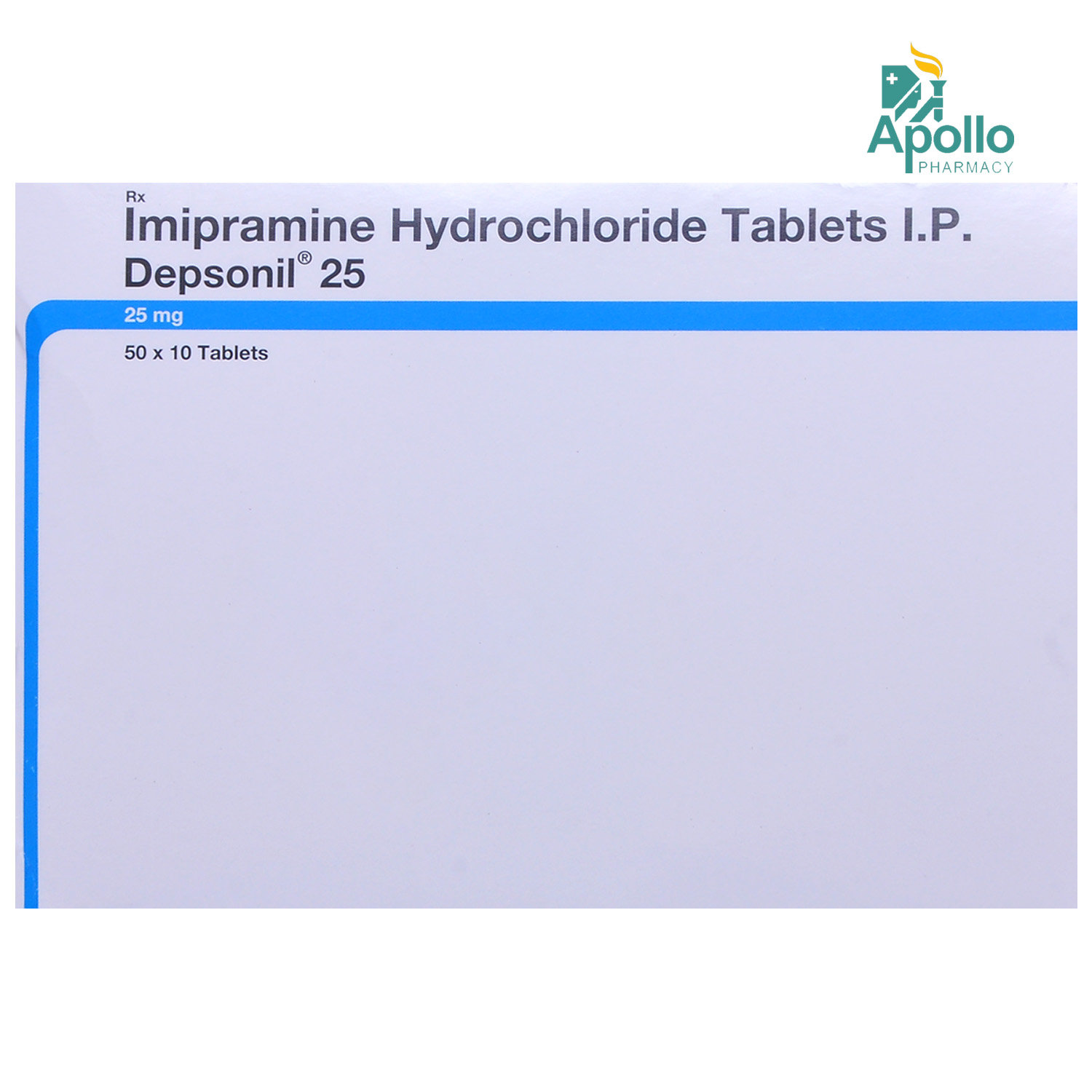Antidep Tablet 10's
MRP ₹17.5
(Inclusive of all Taxes)
₹2.6 Cashback (15%)
Provide Delivery Location
Online payment accepted
 Prescription drug
Prescription drugWhats That
Composition :
Manufacturer/Marketer :
Consume Type :
Expires on or after :
Return Policy :
About Antidep Tablet
Antidep Tablet belongs to a group of medicines called 'tricyclic anti-depressants' used to treat depression. Additionally, Antidep Tablet is also used to treat bed-wetting at night in children aged 6 years and older. Depression is a mood disorder characterised by sadness, unhappiness, anger, hopelessness or loss that interferes with a person’s daily activities.
Antidep Tablet contains ‘Imipramine’, which increases the activity of certain natural substances (neurotransmitters) in the brain required for mental balance, thereby regulating mood and treating depression. It also reduces childhood enuresis or bed-wetting in the children older than 6-7 years of age by relaxing the urinary bladder muscle, which lightens the sleep.
You are advised to take Antidep Tablet for as long as your doctor has prescribed it for you depending on your medical condition and response to the treatment. In some cases, you may experience certain common side-effects such as dry mouth, nausea, vomiting, increased blood pressure, lack of coordination, swelling of the breast and weakness. You are advised to talk to your doctor if you experience these side-effects persistently.
Please do not stop taking Antidep Tablet without consulting your doctor as it could lead to withdrawal symptoms. Consult your doctor if you are pregnant or breastfeeding. Avoid driving or operating machinery as Antidep Tablet may cause impaired alertness, drowsiness or blurred vision. Antidep Tablet is not recommended for children below 6 years as safety and effectiveness have not been established. Avoid consuming alcohol with Antidep Tablet as it could lead to increased drowsiness. Keep your doctor informed about your health condition and medicines to rule out any side-effects.
Uses of Antidep Tablet
Directions for Use
Key Benefits
Antidep Tablet belongs to a group of medicines called tricyclic anti-depressants. Antidep Tablet is used to treat depression. Antidep Tablet works by increasing the activity of certain natural substances in the brain needed for mental balance, thereby regulating mood and treating depression. Additionally, Antidep Tablet is used as an adjunct therapy in reducing bed-wetting at night in children aged 6-7 years and older. Antidep Tablet helps to control childhood enuresis or bed-wetting as a part of its anti-depressant effect.
Storage
- Do not stand up suddenly. Lie down and get up slowly only when you feel better.
- Avoid alcohol and large meals.
- Drink enough water before standing for long periods.
- Exercise regularly; however, avoid exercising in extreme heat.
- Eat small, low-carb meals.
- Wear compression stockings.
- Contact your doctor immediately if you're experiencing a fast heart rate, palpitations, or other heart-related symptoms. This is crucial to determine whether the symptoms are related to your medication.
- Your doctor may need to adjust your medication regimen to alleviate the fast heart rate symptoms. This could involve changing the medication, reducing the dosage, or adding new medications to counteract the side effects.
- Follow your doctor's advice on monitoring your heart rate and blood pressure. This will help track any changes and ensure your heart rate returns normal.
- If you experience severe symptoms such as chest pain, dizziness, or shortness of breath, seek immediate medical attention. These symptoms can indicate a more serious condition that requires prompt treatment.
- Avoid triggers like alcohol, caffeine, and energy drinks.
- Try relaxation techniques such as yoga, meditation, or deep breathing.
- Exercise regularly as it helps maintain heart health.
- Follow a nutritious and balanced diet.
- Skin rash caused by allergies is due to irritants or allergens. Therefore, avoid contact with such irritants.
- Consult your doctor for proper medication and apply an anti-itch medication. Follow the schedule and use the medication whenever needed.
- Protect your skin from extreme heat and try to apply wet compresses.
- Soak in the cool bath, which gives a soothing impact to the affected area.
- Avoid trigger foods that can cause allergic reactions, such as nuts, shellfish, or dairy products.
- Keep a food diary to track potential food allergens.
- Include omega-3 rich foods like salmon and walnuts to reduce inflammation.
- Wear loose, comfortable clothing made from soft fabrics like cotton.
- Apply cool compresses or take cool baths to reduce itching.
- Use gentle soaps and avoid harsh skin products.
- Reduce stress through relaxation techniques like meditation or deep breathing.
Drug Warnings
Do not take Antidep Tablet if you are allergic to any of its contents; if you are taking monoamine oxidase inhibitors (MAOI) or have taken them in the last 14 days, if you have heart diseases, mania, porphyria, glaucoma or are unable to pass urine. Avoid taking buprenorphine/opioids with Antidep Tablet as it could lead to serotonin syndrome. Inform your doctor if you have/had schizophrenia or manic depression, alcohol withdrawal, enlarged prostate, overactive thyroid, epilepsy, low blood pressure, poor circulation, panic attacks, a tumour of the adrenal gland, or if you are being given electroconvulsive therapy. Talk to your doctor immediately if you have suicidal thoughts such as killing or harming yourself. Consult your doctor if you are pregnant or breastfeeding. Avoid driving or operating machinery as Antidep Tablet may cause impaired alertness, drowsiness, or blurred vision. Antidep Tablet is not recommended for children below 6 years as safety and effectiveness have not been established. Avoid consuming alcohol with Antidep Tablet as it could lead to increased drowsiness. Rise slowly from sitting or lying position as Antidep Tablet causes dizziness on standing suddenly.
Drug-Drug Interactions
Drug-Drug Interactions
Login/Sign Up
Taking Sparfloxacin with Antidep Tablet can increase the risk or severity of irregular heart rhythms. The risk increases in patients with a history of heart illness or electrolyte imbalance.
How to manage the interaction:
Taking Sparfloxacin and Antidep Tablet together is not recommended as it can result in an interaction, but it can be taken if your doctor has advised it. However, if you experience sudden dizziness, lightheadedness, fainting, shortness of breath, chest pain or tightness, or a rapid heartbeat, contact a doctor immediately. Do not discontinue any medications without consulting a doctor.
Co-administration of Antidep Tablet with Selegiline might raise serotonin hormone levels in the body, affecting the brain and nerve cells. Increased serotonin hormone can lead to side effects.
How to manage the interaction:
Taking Antidep Tablet and Selegiline together is not recommended as it can result in an interaction. It can be taken if a doctor has advised it. However, if you experience confusion, hallucinations, fits, extreme changes in blood pressure, increased heart rate, fever, excessive sweating, shivering or shaking, blurred vision, muscle spasm or stiffness, shaking, incoordination, stomach cramps, nausea, vomiting, and diarrhea, contact a doctor immediately. Do not discontinue any medications without consulting a doctor.
Taking Tranylcypromine can increase the risk of Antidep Tablet on serotonin syndrome(a condition in which a chemical called serotonin increase in your body).
How to manage the interaction:
Taking Tranylcypromine with Antidep Tablet is not recommended, but can be taken together if prescribed by a doctor. However, consult a doctor if you experience confusion, hallucination(seeing and hearing things that do not exist), fits, blood pressure alteration, increased heart rate, fever, excessive sweating, shivering or shaking, blurred vision, pain in the muscles or stiffness, incoordination, stomach cramps, nausea, vomiting, and diarrhea. Do not discontinue any medications without consulting your doctor.
Using ziprasidone together with Antidep Tablet can increase the risk of an irregular heart rhythm.
How to manage the interaction:
Taking Ziprasidone with Antidep Tablet is not recommended, please consult your doctor before taking it. You should seek immediate medical attention if you develop sudden dizziness, lightheadedness, fainting, shortness of breath, or heart palpitations. Do not stop using any medications without talking to a doctor.
Taking Antidep Tablet with Dronedarone can increase the risk or severity of irregular heart rhythms. The risk increases in patients with a history of heart illness or electrolyte imbalance.
How to manage the interaction:
Taking Antidep Tablet with Dronedarone together is not recommended as it can result in an interaction, it can be taken if your doctor has advised it. However, if you experience sudden dizziness, lightheadedness, fainting, shortness of breath, chest pain or tightness, or a rapid heartbeat, contact a doctor immediately. Do not discontinue any medications without consulting a doctor.
When Thioridazine and Antidep Tablet are taken together, the body's ability to break down Thioridazine may be reduced. This can increase the risk or severity of side effects.
How to manage the interaction:
Taking Antidep Tablet with Thioridazine is generally avoided as it can possibly result in an interaction, it can be taken if your doctor has advised it. However, if you experience extreme drowsiness, confusion, agitation, vomiting, blurred vision, feeling hot or cold, sweating, muscle stiffness, fainting, or seizure, contact your doctor immediately. Do not discontinue any medications without consulting a doctor.
Coadministration of Antidep Tablet with Phenelzine might raise serotonin hormone levels in the body, affecting the brain and nerve cells.
How to manage the interaction:
Taking Antidep Tablet and Phenelzine together is not recommended as it can result in an interaction. It can be taken if your doctor has advised it. However, if you experience confusion, hallucinations, seizures, extreme changes in blood pressure, increased heart rate, fever, excessive sweating, shivering or shaking, blurred vision, muscle spasm or stiffness, tremors, incoordination, stomach cramps, nausea, vomiting, and diarrhea, contact a doctor immediately. Do not discontinue any medications without consulting a doctor.
Coadministration of Linezolid with Antidep Tablet might raise serotonin hormone levels in the body, affecting the brain and nerve cells.
How to manage the interaction:
Taking Linezolid and Antidep Tablet together is not recommended as it can result in an interaction, but it can be taken if a doctor has advised it. However, if you experience confusion, hallucinations, seizures, extreme changes in blood pressure, increased heart rate, fever, excessive sweating, shivering or shaking, blurred vision, muscle spasm or stiffness, tremors, incoordination, stomach cramps, nausea, vomiting, and diarrhea, contact a doctor immediately. Do not discontinue any medications without consulting a doctor.
Coadministration of Safinamide with Antidep Tablet can increase the risk of serotonin syndrome(a condition in which a chemical called serotonin increase in your body).
How to manage the interaction:
Taking safinamide and Antidep Tablet together is not recommended as it can result in an interaction, but they can be taken together if prescribed by a doctor. However, consult a doctor if you experience confusion, hallucinations (seeing and hearing things that do not exist), fits, blood pressure alteration, increased heart rate, fever, excessive sweating, shivering or shaking, blurred vision, pain in the muscles or stiffness, incoordination, stomach cramps, nausea, vomiting, and loose stools. Do not discontinue any medications without consulting your doctor.
Taking Antidep Tablet and Potassium citrate (in tablet or capsule form) together can increase the risk of stomach ulcers, bleeding, and gastrointestinal injury.
How to manage the interaction:
Taking Potassium citrate and Antidep Tablet is not recommended, as it may lead to an interaction, it can be taken if prescribed by the doctor. However, if you experience severe stomach pain, bloating, sudden lightheadedness or dizziness, nausea, vomiting (especially with blood), decreased hunger, or dark, tarry stools, consult the doctor immediately. Do not discontinue any medications without a doctor's advice.
Drug-Food Interactions
Drug-Food Interactions
Login/Sign Up
Diet & Lifestyle Advise
- Maintain a healthy diet and exercise regularly as it helps in improving overall health and boosts self-esteem.
- Regularly attend therapy sessions.
- Perform meditation and yoga. This helps in relieving stress and provides relaxation.
- Follow a regular sleep pattern to improve the amount and quality of sleep you get.
- Include foods rich in omega fatty acids such as fish, nuts, fresh fruits, vegetables and olive oils.
- Neurotransmitters are made up of amino acids. Amino acid-rich foods such as meat, dairy products, and certain fruits and vegetables help in the proper maintenance of neurotransmitters.
- Complex carbohydrates help in stimulating serotonin (a feel-good neurotransmitter). These include whole grains, legumes, spinach, broccoli, oranges and pears.
- Exercising helps in the production of the body’s natural anti-depressants. It also helps in relieving stress, improves mood, boosts self-esteem and provides restful sleep.
- Avoid smoking and alcohol consumption.
- Learn about your condition, understand the risk factors and follow the doctor’s treatment plan.
Side Effects of Antidep Tablet
- Dry mouth
- Nausea
- Vomiting
- Increased blood pressure
- Lack of coordination
- Swelling of breast
- Weakness
- Trouble urinating
- Blurred vision
- Breast swelling in men and women
Habit Forming
Therapeutic Class
All Substitutes & Brand Comparisons
RX
Not for online saleDEPRID 25MG TABLET
Sigmund Promedica
₹9
(₹0.82 per unit)
48% CHEAPERRX
Out of StockNot for online saleImicalm-25 mg Tablet 10's
East West Pharma India Pvt Ltd
₹8.3
(₹0.83 per unit)
47% CHEAPERRX
Not for online saleDimip 25mg Tablet 10's
D D Pharmaceuticals Pvt Ltd
₹12
(₹1.08 per unit)
31% CHEAPER
Author Details
We provide you with authentic, trustworthy and relevant information
Drug-Diseases Interactions
Drug-Diseases Interactions
Login/Sign Up
FAQs
Drug-Drug Interactions Checker List
- FLUOXETINE
- FLUVOXAMINE
- DULOXETINE
- ESCITALOPRAM
- SERTRALINE
- ARIPIPRAZOLE
- QUETIAPINE
- CARBAMAZEPINE
- PHENYTOIN
- PHENOBARBITAL
- PREGABALIN
- TOPIRAMATE
- DIAZEPAM
- NITRAZEPAM
- OXAZEPAM
- ALPRAZOLAM
- CLONAZEPAM
- ASPIRIN
- TRAMADOL
- CODEINE
- DIHYDROCODEINE
- RITONAVIR
- CIMETIDINE
- ESOMEPRAZOLE
- WARFARIN
- CYCLOBENZAPRINE
- LEVOTHYROXINE
Special Advise
- Close monitoring of patients taking Antidep Tablet for suicidal behaviour, clinical worsening, or unusual changes in behaviour is recommended. Consult the doctor immediately if the patient experiences suicidal thoughts such as killing or harming oneself.
- Talk to your doctor before taking Antidep Tablet if you are due to have any surgery that involves an anaesthetic, including dental surgery.
- Your doctor may advise regular blood tests and liver functioning tests while taking Antidep Tablet .
- Antidep Tablet may cause problems with your teeth, so a regular dental check-up is advised.
Disease/Condition Glossary
Depression: Depression is a mental health disorder characterised by a persistent and intense feeling of sadness for an extended duration of time. It mainly impacts mood, behaviour and other physical functions, such as sleep and appetite. Symptoms include sadness, loss of interest, appetite changes, sleep problems, restlessness, lack of energy, feeling worthless or guilty, thoughts of harming oneself, difficulty in concentrating, making decisions and thinking. The exact cause of depression is unknown. However, factors such as stress, changes in hormone levels, alcohol or drug abuse, abuse during childhood, certain medical conditions and medications might increase the risk of developing depression.
Bed-wetting: Childhood enuresis is also known as bed-wetting in children. In most cases, children are toilet trained by the age of 5, but generally, there is no target date for complete bladder control development. A small number of children still wet the bed even after the age of 7 years. This may or may not be purposeful, and the condition is not diagnosed until the child is 5 years or older. The causes could be a small bladder, urinary tract infections, stress and developmental delays that could interfere with toilet training. Symptoms include repeated bed-wetting, wetting in the clothes and wetting at least twice a week for 3 months.

Have a query?
Alcohol
Safe if prescribed
Avoid consumption of alcohol while taking Antidep Tablet as it may cause increased drowsiness.
Pregnancy
Consult your doctor
Antidep Tablet belongs to pregnancy category C. Please consult your doctor if you have any concerns regarding this; your doctor will prescribe only if the benefits outweigh the risks.
Breast Feeding
Consult your doctor
Antidep Tablet may pass into breastmilk. Consult your doctor before taking Antidep Tablet ; your doctor will decide whether Antidep Tablet can be taken by breastfeeding mothers or not.
Driving
Safe if prescribed
Antidep Tablet may cause impaired alertness, drowsiness or blurred vision. Do not drive or operate machinery if you experience these symptoms.
Liver
Consult your doctor
Dose adjustment may be needed in patients with liver impairment. Please consult your doctor if you have a liver impairment or any concerns regarding this.
Kidney
Consult your doctor
Dose adjustment may be needed in patients with kidney impairment. Please consult your doctor if you have kidney impairment or any concerns regarding this.
Children
Safe if prescribed
Antidep Tablet is not recommended for children below 6 years as its safety and effectiveness have not been established.












_0.jpg?tr=q-85)

